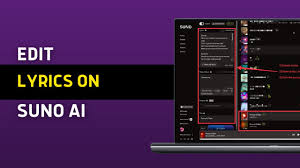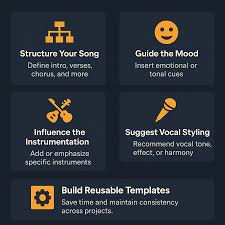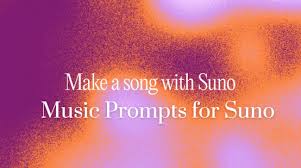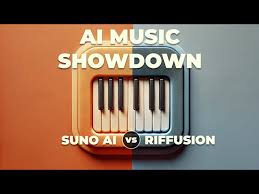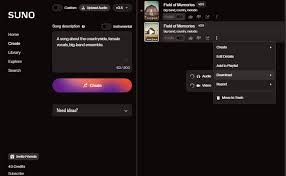When you start using Suno AI, one of the first things you should familiarize yourself with is the Suno terms of service. While most people skip over terms of service documents, they contain crucial information about your rights, responsibilities, and limitations when creating music with AI. Since Suno has become one of the most talked-about AI music generators in 2025, it’s worth taking a close look at what the terms really mean for everyday creators, hobbyists, and professionals.
This guide breaks down the Suno terms of service in plain English, highlights important sections, and provides insights into how these rules affect you as a user.
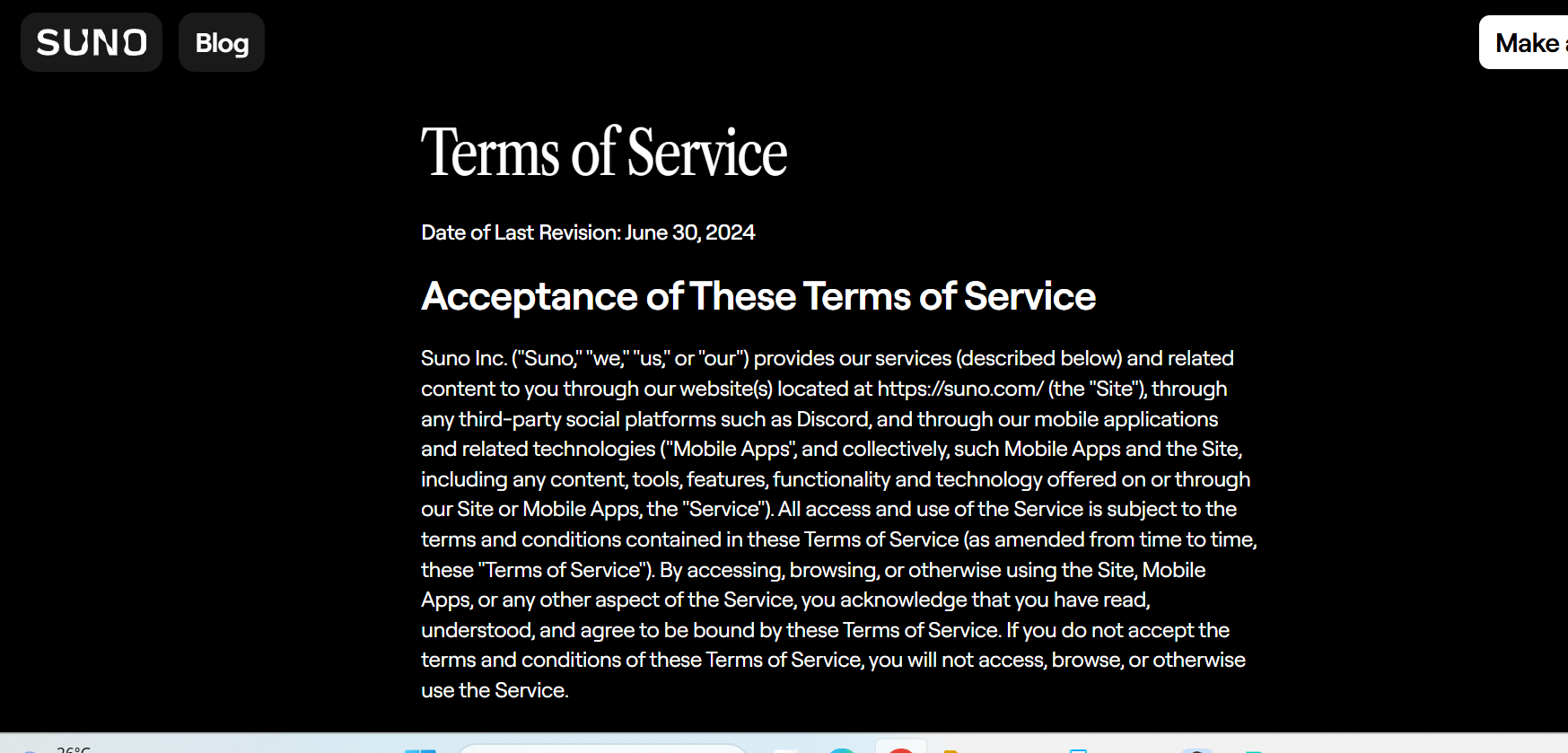
Why Do the Suno Terms of Service Matter?
Whenever you use an AI tool, you’re entering into a legal agreement. The Suno terms of service are not just formalities—they define:
Who owns the rights to the music you create.
What you’re allowed to do with AI-generated songs.
What limitations apply if you’re using the free plan versus a paid plan.
How Suno handles content moderation, copyright, and fair use.
For musicians, producers, and content creators, understanding these details prevents future disputes, especially when releasing music commercially or monetizing through platforms like Spotify, YouTube, or TikTok.
Key Sections of the Suno Terms of Service
Account Eligibility and Use
Suno requires that you be of legal age (usually 18 or older) to create an account. The terms also specify that accounts cannot be shared across multiple users. If you’re using Suno as part of a studio or team, each member typically needs their own license.
User Content and Ownership
This is one of the most important sections. According to the Suno terms of service, you maintain ownership of the content you input—like prompts, lyric edits, and uploaded references. However, Suno also has the right to use that input to improve their models unless you are on specific enterprise agreements that restrict data usage.
AI-Generated Output Rights
The question of “Who owns AI-generated music?” is complex. Suno’s terms clarify that users are generally granted broad rights to use the songs they generate, including commercial use, as long as they comply with copyright law. However, users are responsible for ensuring that their output does not infringe on third-party rights.
Prohibited Use
Suno restricts certain activities, including:
Generating content that is offensive, illegal, or harmful.
Attempting to reverse-engineer the AI models.
Using Suno outputs to train competing AI systems.
Violating these rules can lead to account suspension or permanent bans.
Subscription Plans and Payments
The Suno terms of service also outline rules around free versus paid plans:
Free plan: You can generate songs but with limitations on length, downloads, and licensing.
Pro plan: Grants higher priority in the queue, extended usage rights, and more downloads per month.
Enterprise plan: Offers custom terms, often with added protections around data usage and commercial rights.
Understanding these tiers ensures you choose the right subscription for your music goals.
Copyright and Licensing
Suno explicitly states that it does not guarantee all generated music is free of copyright risk. For example, if the AI unintentionally produces a melody similar to an existing copyrighted work, liability rests on the user. This means if you plan to distribute music commercially, you should still consider copyright checks or legal consultation.
Real-World Example: Using Suno Under Its Terms
Imagine you create a catchy pop track with Suno and want to upload it to Spotify. Under the Suno terms of service:
You have the rights to publish the track commercially.
You’re responsible for ensuring the lyrics and melodies don’t infringe on existing works.
If you’re on a free plan, your song may include limitations on usage, so upgrading to Pro ensures you’re safe for commercial release.
Suno retains the right to use anonymized data from your project to refine its AI, unless you’ve negotiated otherwise under enterprise terms.
Suno Terms of Service vs Other AI Music Tools
It’s helpful to compare Suno’s approach with competitors:
AIVA: Focuses more on classical and cinematic music, with a licensing system for commercial use.
Mubert: Provides royalty-free soundtracks but restricts certain types of commercial redistribution.
Boomy: Allows quick song generation for social media but with stricter limitations on distribution unless you subscribe to paid tiers.
Suno distinguishes itself by offering relatively broad commercial rights from the start, but users must remain cautious with copyright risks.
Common Misunderstandings About the Suno Terms of Service
“Suno owns my music.”
False. You generally own the rights to your outputs, but Suno can use your data for training unless otherwise agreed.“All AI music is automatically copyright-free.”
Not true. Copyright law is still evolving around AI works. You are responsible for avoiding infringement.“I can use one account for my whole team.”
This violates the Suno terms of service—each user typically needs their own account.“Free users can release songs commercially with no issues.”
Free tiers usually have stricter limitations, so check carefully before monetizing outputs.
Best Practices for Staying Compliant
Always review the latest Suno terms of service (they update periodically).
Upgrade to a paid plan if you plan to release tracks commercially.
Use editing tools within Suno to make your lyrics and melodies unique, reducing copyright risks.
Keep a record of your prompts and edits for proof of originality.
If working as a label or studio, consult with Suno directly for enterprise agreements.
Conclusion
The Suno terms of service are more than just legal fine print—they set the foundation for how you can safely and effectively use the platform to create music. By understanding what rights you have, what responsibilities you carry, and what limitations apply, you can avoid future headaches and make the most of Suno’s AI-powered creativity.
Whether you’re an independent artist uploading your first track to YouTube or a professional producer exploring AI-assisted workflows, staying compliant with Suno’s terms ensures your music journey is both creative and secure.
FAQs About the Suno Terms of Service
1. Do I own the songs generated with Suno AI?
Yes, you generally own the rights to your AI-generated songs, but you must ensure they don’t infringe on third-party copyrights.
2. Can I monetize music created with Suno on Spotify or YouTube?
Yes, especially on paid plans. Free plans may include certain restrictions.
3. Does Suno use my data?
Yes, unless specified otherwise, Suno may use your inputs and outputs to train its models.
4. Can I share my Suno account with a collaborator?
No. Each user is required to have their own account.
5. What happens if I violate the Suno terms of service?
Your account may be suspended or permanently banned.
Learn more about AI MUSIC

